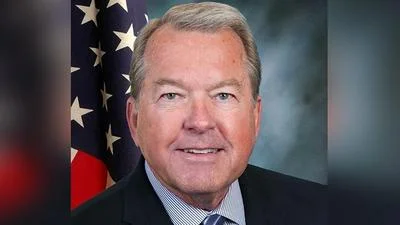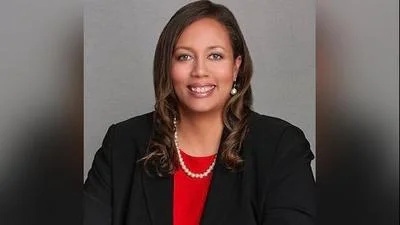Laurie Parman | Facebook / Elect Laurie Parman for Illinois State Representative
Laurie Parman | Facebook / Elect Laurie Parman for Illinois State Representative
Laurie Parman, a former Republican candidate for the Illinois House of Representatives, is adding her voice to the growing chorus of critics applauding President Donald Trump’s move to cut federal funding to NPR and PBS.
Parman, a retired teacher, argues that outlets like NPR have strayed from their original mission and no longer deserve taxpayer support.
“I believe that public funding of any media is a construct that is no longer sustainable,” Parman told the Kane County Reporter. “Because publicly funded media has drifted over decades from folksy home entertainment to one-sided political conversation, it is no longer suited for the receipt of public funds. At best, it represents 50% of the public. I believe the concept needs to go away or take available funds and divide equally. Either option is fair. The current situation is simply not fair.”
Trump’s executive order titled "Ending taxpayer subsidization of biased media" cited mounting concerns about political imbalance and editorial bias at NPR and PBS. The executive order states that the public funding of news is "corrosive to the appearance of journalistic independence" and said the federal government should “fund only fair, accurate, unbiased, and nonpartisan news coverage.”
That criticism has come from internal sources as well.
NPR senior editor Uri Berliner relayed published an op-ed in The Free Press titled "I’ve Been at NPR for 25 Years. Here’s How We Lost America’s Trust" accusing the network of editorial groupthink arguing that NPR has alienated politically diverse audiences and failed in its mission of viewpoint neutrality.
A recent congressional inquiry also revealed that NPR’s Washington, D.C., newsroom comprises 87 registered Democrats and no Republicans.
That criticism has been echoed by conservative watchdog groups and those like Parman, who challenged the foundational assumption that journalism should be publicly subsidized at all.
“I believe if you start with the wrong question you can only end up with the wrong answer,” Parman said. “It is NOT the job of the media to ‘represent.’ It is the job of the media to create engaging and compelling content - period! It is up to the market to decide if they have done that. To give public funds to a media outlet gets in the middle of this and hurts the quality of the media as an entity. This is precisely what has happened. Trust in the media is at an all time low, and practices such as fortifying one outlet artificially over another is a practice that ends in mediocracy. If you can't sell a newspaper at a profit on your own, why should we give you public dollars to waste?”
Parman cited declining trust in media institutions and criticized what she sees as an unfair system propping up favored outlets.
“Trust in the media is at an all-time low,” she said. “And practices such as fortifying one outlet artificially over another is a practice that ends in mediocracy. If you can't sell a newspaper at a profit on your own, why should we give you public dollars to waste?”
The Chicago Sun-Times, owned by NPR affiliate Chicago Public Media, has pushed back against the funding cut. The paper defended Chicago Public Media’s $2 million taxpayer subsidy, calling it vital to local journalism and press freedom.
“Freedom of the press is under threat,” the Sun-Times intoned.
But Parman says the outcry misses the point.
“I think that's childish and ridiculous,” Parman said. “No one is telling NPR they can't deliver their content - NO ONE. All that is being said by this action is this: If it is important enough to you, you will have to pay for it yourself like all the other outlets.”
NPR CEO Katherine Maher has also come under scrutiny, particularly for advocating for limiting free speech during her time as CEO of Wikipedia.
During a recent congressional hearing lawmakers questioned Maher.
Maher admitted that NPR had avoided covering key stories critical of Democrats.
Maher was also confronted about past tweets reflecting controversial left-wing views including her 2020 assertion that “America is addicted to white supremacy,” that the concept of a “free and open” Internet was a “white male Westernized construct” and Trump is a “deranged racist sociopath.”
Parman was unsparing in her assessment of Maher’s public statements.
“After listening to Katherine Maher, I can say, ‘Yeah, that's definitely offensive.’ However, that is not the point of this discussion,” Parman said. “The point of this discussion is that the United States of America is hemorrhaging money, and it's time to look at our budgets and say, ‘This is a ridiculous expenditure, and in this day and age every outlet should create engaging content on its own dime and see if anyone wants to read it.’”
The Media Research Center has praised the defunding measure, calling NPR and PBS the “TV and radio equivalent to MSNBC” out of step with the values of many taxpayers.
Rapid Response 47, a grassroots conservative network, went further, accusing the organizations of spreading “radical, woke propaganda.”
For Parman, the debate is about more than ideology—it’s about accountability and competition in the media marketplace.
“There is no doubt that America has lost its appetite for most things NPR,” Parman said. “They have spoken with their feet. It's time they got to take their wallets with them.”
Kane County is served by Chicago Public Media’s WBEZ Chicago (95.1 FM), the region’s NPR affiliate, which also owns and operates the Chicago Sun-Times, and WTTW (Channel 11), Chicago’s primary PBS station.






 Alerts Sign-up
Alerts Sign-up